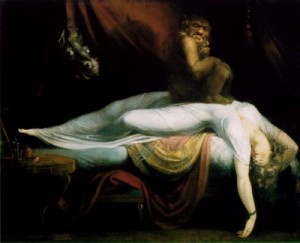
In April, I gave a lecture at Stanford University on sleep paralysis and hypnagogia. The teaching assistants of Dr. William Dement’s class were kind enough to record the talk, so I cleaned it up a little and added a creative-commons badge so it can be shared and remixed to your heart’s content.
Borderlands of Consciousness is a basic introduction to the spooky-sexy fun of sleep paralysis visions, including the science, psychology and cross-cultural history of the topic. It’s aimed at students and others who may be looking to reduce the fear of sleep paralysis attacks that come out of the blue.
You can listen to the podcast here.
Or, as I explain in the talk, simply invert the known causes and triggers, and learn how to use sleep paralysis as a gateway to out-of-body experiences and lucid dreaming.
You’ll also learn how, the night before I gave this talk, I was accosted by the Palo Alto Tickling Spirit, a mischievous imp that apparently haunts the local Super 8 Motel.
 If you’d rather download the MP3, click here for the zipped file.
If you’d rather download the MP3, click here for the zipped file.
Image: Henry Fuseli’s 1781 classic The Nightmare
I’ve been conducting my own experiment with hypnagogia. I figure that since becoming lucid during a dream isn’t working, I’ll try going in through the front door. It’s been fascinating, because I’m getting better at catching myself in the middle of hypnagogic reveries. I’ll find myself accepting a certain thought or image, and then I’ll stop and think, “Wait, I did not intentionally think or imagine that. That was an unconscious creation!” What’s blowing me away is how cleverly hypnagogic imagery disguises itself as normal perception and rational thought. I had somewhat of an epiphany last night when it suddenly seemed that there is no difference between hypnagogic reveries and waking awareness. In other words, waking consciousness (it seems sometimes) is just as much an unconscious creation as hypnagogia is.
awesome epiphany. I also love the idea of “going through the front door.” Robert Moss discusses this a lot in his dream work too — it’s a vastly under-rated path to lucidity.
You need to know just how dangerous sleep paralysis is. People have died from it and it gets fobbed off as adult death syndrome. If you’d like to know more please contact me. Just be careful it is dangerous. Jonathan
Dear Jonathan, thanks for commenting, I appreciate your candor. but I respectfully disagree that sleep paralysis in most cases is dangerous …. however I do think that beliefs that sleep paralysis is dangerous is dangerous. Shelly Adler’s work on this topic (espcially SUNDS, the Hmong refugees, and the folklore around nocturnal pressing spirits) is the most in-depth look at this complex system of how culture and personal beliefs can worsen a biological disposition. And of course, sleep paralysis can be a symptom of a larger issue, including sleep apnea, PTSD and anxiety disorders.
Can you really die from sleep paralysis?!? I’m researching this topic for my self. I have suffered from this for about 2 years now, not every night, but almost on a weekly basis. If I’m lucky i can go 2 weeks. But last night it happen again and really scared me. I thought i was going to die as usual, but something different this time, There seemed to be a calming voice trying to get me to give in… I dont know how to expain it but when i finally came to I could swear something was still stalking me. do you think this is all just chemicals in our brains doing things there not ment to do, or do you think that this is something more.